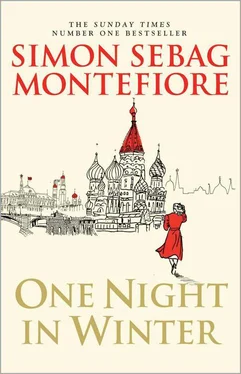‘I know my Pushkin,’ he said guardedly. ‘But I don’t know if NV was animal, vegetable, or mineral.’
‘GOOD MORNING, LITTLE Professor. Rise and shine!’ said the buxom prison warder whom Senka had nicknamed Blancmange. ‘Have you got any new words to teach us?’
Senka noticed her new tone. He was still in the silk striped pyjamas he had been wearing when he was taken; it was past time he changed them. His mother would never let him wear the same pyjamas for so long!
‘Did you sleep at all?’ asked Blancmange.
‘I slept better.’
‘Good. You need to rest for what’s ahead!’
An hour later, Blancmange brought his breakfast. She smiled at him, ruffled his hair and even presented him with an extra two pieces of Borodinsky bread and a huge triangle of goat’s cheese. ‘You’ve lost weight, young man. We need to feed you up. They’ll be back in a minute to take you down for your daily chat.’
Chat? Cheese? Senka wondered what was going on. He wondered again when the guards joked as they escorted him, one even swinging his keys like a lantern. Could they have solved the murder case? If these lumpy men were really members of the famous Cheka, Knights of the Revolution, founded by the heroic Comrade Dzerzhinsky, they should have solved it by now. Senka himself could have solved it much faster. Probably there was no ten-year-old in the world who had to consider such serious matters as he did.
He was shown into a different interrogation room where he found a new interrogator named Colonel Komarov. Where was the Lobster? Tormenting someone else or lying drunk somewhere in a fecal heap, he hoped. Even better, perhaps someone was punching him !
The curly-haired new man didn’t look like a Chekist at all. He actually smiled at him. Senka dropped his chin and raised his brown eyes in what his mama called his matinée-idol look. Surely someone in here actually thought children were worth bothering with? When the interrogator lit a cigarette, Senka noticed that he was missing half a finger on his right hand.
‘When can I see my mama?’ he asked, encouraged by Komarov’s apparent friendliness. Mama often said that she needed to cuddle him as much as possible and certainly ten times a day. Poor Mama hadn’t cuddled him for weeks. ‘Is my mama all right? I fear that she might be missing me? I’m missing her profoundly.’
‘You’ll see her soon if you’re helpful to us,’ Komarov replied, crossing his legs so that his boots creaked.
‘I’ve been helpful so far, haven’t I?’
‘You certainly have.’
Not too helpful, thought Senka. Only a simpleton would be too helpful.
‘So,’ Komarov said, leaning forward, frowning solicitously on his low furrowed brow, pretending to be very interested in Senka, ‘I went to a football match yesterday to see Spartak.’
Oh no, thought Senka, this one’s going to speak to me as if I’m like all the other little boys. Big mistake, Colonel Komarov.
‘I bet you like football, eh? I bet you’re a real footballing man.’
‘Well…’ Senka considered whether to humour him or whether to tell him the truth about his attitude to sports. If the Lobster had asked him, he might have lied, but this one seemed kinder. ‘Actually, I don’t like football.’
‘I thought all boys like football?’
‘Not all,’ replied Senka proudly.
‘So I bet you like basketball then? Are you a bit of a basketball kid?’
‘No,’ said Senka.
‘Camping?’
‘Are you joking? I hate cold and discomfort.’
‘So what do you like?’
‘Opera. Ballet. Fiction. Poetry.’
Komarov shook his head, so Senka added, ‘I’m serious. I hate all sports.’
‘You’re very grown up for your age,’ Komarov said.
Where was this going? What were they after now? Senka thought. Play along until you find out. ‘Not really, but I do prefer to wear a suit at all times.’
Komarov suddenly put out his cigarette. ‘Tell me about your papa.’
Prepare all defences, Senka told himself. Man the fortifications. Load the cannons. Sharpen your cutlasses. Something’s not right.
‘He works very hard on the Central Committee. He doesn’t laugh at my jokes like Mama does and he doesn’t cuddle me. He’s very strict, but Mama says that’s because his job is very important.’
‘Does he ever talk about politics?’
‘Never.’
‘What stories does he tell about work?’
‘None. He says his work is secret and if I asked him about it, he might smack me. Very hard.’
‘Quite right. Does he ever mention Comrade Stalin, for example?’
Senka concentrated hard in order to say the right thing. ‘No, except to say, “Today we’ll celebrate the Great Stalin’s birthday,” and, every night, before we eat at dinner, he thanks “the Great Stalin”.’
‘Do your parents like your apartment?’
‘Yes, they love the apartment.’
‘How many dachas do you have?’
‘Two. Like everyone else.’
‘Most people have no dacha at all,’ Komarov replied. ‘Is two excessive? Does your mother want more dachas?’
‘No.’ Where was this going? ‘She’s not interested in material things.’ Which is a lie, of course, Senka told himself. Mama loves dachas and luxuries from the West.
‘Your mother’s very well dressed, isn’t she?’
‘She’s the most beautiful mama in the world.’ Your love for mama is your weakness . Think carefully!
‘Does she talk about where she gets her perfumes and clothes?’
‘Mama’s very hard-working. She’s a doctor.’
‘But she likes the good things in life, doesn’t she? How many fur coats does she have?’ Komarov asked.
‘I don’t know but she looks so beautiful in them.’
‘I’d like to hear more about your mother. Will you tell me?’
How strange, Senka thought, that there were no questions about them any more, the schoolchildren.
‘What do you want to know?’
‘Do your parents ever talk about politics?’ Komarov asked again.
Not in front of us, Senka thought. Only when they whisper in the bathroom (though I sometimes hear things I shouldn’t). He was about to say this, and then thought that if they were whispering, it would be because they didn’t want anyone to hear, so he decided not to.
‘They talk about what’s for dinner, what films to see, the weather.’
Komarov reached over and stroked Senka’s cheek; then he followed the line of his jaw all the way to his chin, which he tilted up a little with the stump of his finger. Senka sat very still, and tried not to shiver.
‘You must help us. If you don’t, you won’t see your mama. Ever again’
‘I will. I promise,’ Senka whispered.
‘Now,’ said Komarov, straightening up and speaking normally. ‘Did you hear your father boasting how his “Genius Boss” used to trust him, but that now he didn’t appreciate his talents?’
Senka was instantly alert, adrenalin pumping. His father worshipped Stalin, everyone knew this – but he had once, after Stalin had sacked him early in the war, criticized his master. But how did Komarov know this? It had been in the garden at the dacha. No one had been there except his parents and him. Minka was away. But he remembered now that Demian had been present. Demian had heard it.
‘These are just tiny things,’ said Komarov affably. ‘Nothing really. But you probably remember the occasion? Do you?’
‘Criticizing the Head of the Soviet Government would be very out of character for my father,’ said Senka.
‘Don’t fool with me, kid. Don’t lie. And there’s another little thing. Do you remember the time your mother said, “After all they’ve been through, our Jewish compatriots round here need some place of their own?” Presumably she meant a Jewish homeland? A Zion in the Soviet Union. She’s Jewish, isn’t she? Before she was married, wasn’t she called Dashka Moiseivna Diamant?’
Читать дальше












